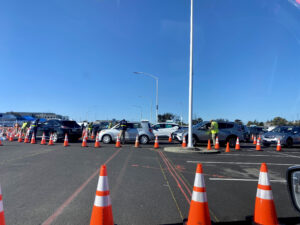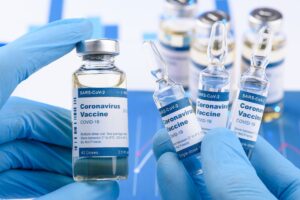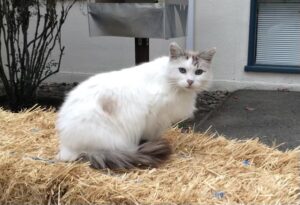At the time of this article’s publication, the 2021 spring semester is drawing to a close, leaving students at Mills with another several months of pandemic learning under their belts. In many ways, Mills’ spring COVID-19 prevention protocols were similar to those observed during the fall semester: the majority of classes were still taught entirely online, all meals were still taken to go from the Tea Shop, and students living on campus were still required to wear masks and practice social distancing at all times, except when alone or with members of their social bubble.
However, certain requirements and restrictions on campus have been reduced over the course of the semester, in compliance with Alameda County guidelines. On April 13, the Office of the Dean of Students sent an email announcing that current Mills faculty, staff and students would be permitted to access campus daily from 7 a.m. to 7 p.m., as long as they were in possession of one of the red campus access passes provided by the school in October 2020. Previously, only residential students, staff and faculty were allowed to access the campus unless special approval was granted. The same email granted on and off-campus students the ability to use the campus tennis courts and the Chapel via appointment or special approval. These decisions were made in light of Alameda County entering the orange tier of California’s color-coded COVID-tracking system on March 30, indicating “moderate” COVID-19 spread. More specifically, entering the “orange” tier means that Alameda County shows 2 to 5.9 new COVID-19 cases daily per 100,000 residents and positive results from 2 to 4.9% of COVID-19 tests administered.
Some of Mills’ sports teams have also begun gathering their members for in-person meetings this semester, allowing students to use campus exercise equipment and practice their skills in the company of their peers. Second-year student Sierra West, a member of Mills’ volleyball and tennis teams, has been able to attend in-person practice sessions for both of her sports in recent weeks. At practice, players must remain masked except for socially distant water breaks and sanitize their hands at 15-minute intervals; members of each team are also randomly selected for COVID-19 testing each week. West says she is “very grateful” for the opportunity to resume in-person practice and believes that it has “greatly benefited [her] mental health.”
Access to indoor study spaces has also expanded this semester, offering students some respite from bedroom solo study sessions. Since April 12, F.W. Olin Library has been open 12 to 5 p.m. Monday through Thursday as a study space; capacity is limited, but spaces are available on a first-come, first-serve basis, to both on and off-campus students. Between April 8 and May 7, the dining rooms in the Warren Olney and Ethel Moore dorms were opened as study spaces for residents on Tuesdays and Thursdays from 12 to 5 p.m. Students using the dining rooms were provided with sanitizing supplies with which to wipe down tables and sign-up sheets to write down their name and Mills ID number upon entering, according to Area Coordinator Joelle Balthazar.
Sophomore Sasha Powers, a current resident of Ethel Moore, says “I’ve used the dining room in Ethel Moore a few times [to study] and it is so helpful to get a change of scenery. […] A big part of my study practices before the pandemic involved working in places that weren’t my bedroom, and having that separation was really helpful.”
Although many classes will still be offered virtually next term, many students anticipate an increased number of in-person classes for fall semester. Second-year students Amelia Binnett, Jilleen Jewell and Hannah Powell each report that their schedule contains at least one in-person science lab. All three say they are looking forward to resuming lab learning in-person. Jewell believes that “since the stay-at-home order last March, labs have become more about busywork than teaching skills,” and Powell concurs, saying that “online labs make it way harder to engage with the content” and that they “don’t think [online labs] were fun for the professors or the students.” Binnett thinks the small class sizes and required use of personal protective equipment common to science labs lend themselves well to in-person pandemic learning, noting that “mask-wearing was part of lab procedure in biology labs and other laboratory environments even before COVID.”
However, none of the three are sure yet about which other elements of their schedule may be in-person. Binnett says she “[wants] lecture classes to be online until it’s completely safe, especially to accommodate people who still may be unable to return to campus,” and Jewell notes that there’s little significant difference between online and in-person lecture classes, quipping “PowerPoints are PowerPoints.”
Some students already have experience with in-person pandemic learning at Mills; although the majority of classes were online, students taking certain classes in fields like art and physical education were required to show up on campus to participate. One of these students was Katherin Vasquez, a sophomore living on campus who took the Campus Farm Practicum course this spring. Every Wednesday, Vasquez spent two hours at the Mills Community Farm, working with other students and the farm manager. Though they were initially apprehensive about the in-person contact required, they said that the social distancing procedures the class followed helped make it “not so scary,” and that being required to go outside and socialize with class members was ultimately beneficial for them.
Vasquez did note that the location and labor component of Campus Farm Practicum required them to “navigate [their] physical disability,” a difficulty they do not face with Zoom classes. They anticipate future struggles of this kind when they are once more required to travel around campus to get between classes, as well as potential difficulty participating in class, since pandemic-induced isolation has intensified their social anxiety. Most of all, they worry that the advent of in-person classes and the loosening of other COVID-19 restrictions may lead to Mills “no longer being compassionate toward those who are still struggling with the pandemic/transition.”
During their interviews, multiple students expressed anxiety about the possibility that returning to in-person classes would require close contact with people who might not be vaccinated against COVID-19. However, it appears Mills will be taking steps to reduce or eliminate that risk. On May 5, Chicora Martin, Vice President of Student Life and Dean of Students, sent the student body an email stating that any student who plans to participate in in-person activities must either submit proof of vaccination for COVID-19 or complete an “exemption process” before the fall semester. Martin says students will be provided with a “formal policy and detailed process” via email over the summer.
Several Mills students on campus have already gotten a head start on the vaccine requirement, obtaining appointments at locations including walk-in clinics, CVS stores and the George R. Moscone Convention Center in San Francisco. Binnett, Powers, Vasquez and West have all been able to obtain one or both doses of a vaccine. They all continue to take their usual precautions against COVID-19, although Powers has made plans to see her elderly grandmother in-person over the summer, and Binnett has found herself leaving campus more often to drive members of her social bubble to their own vaccine appointments. All four report that the most significant change to their lives in the aftermath of the vaccine has been decreased feelings of COVID-19 anxiety, or increased comfort in going about their daily lives.
As Powers puts it, “I can finally do something that feels concrete to protect myself and the people I love from this virus.”




